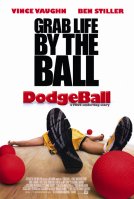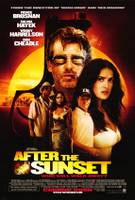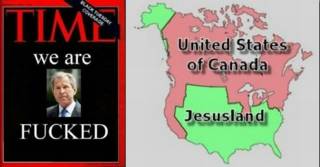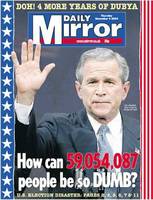Still, at least Americans are once again paying attention to the pain and suffering of others, instead of only worrying about the normal American dilemma: "McDonalds or Taco Bell?" Regrettably, reality wasn't good enough for most news broadcasts, so the ubiquitous solution involved cutting to a highlight real of the dreadful weather-is-kinda-like-a- giant-monster-or-alien-invasion flick "The Day After Tomorrow." (Also, we can't help but worry about celebrities hurt by the Southeast Asian catastrophe.)
You know it's a great public-relations event and truly heart-warming story all at once when even corporations are pitching in, with the likes of Pfizer offering $35 million in relief funds (an amount equal-to or higher than the donations promised by most major nations) and Amazon.com setting up a system for customers to give funds to the American Red Cross disaster relief program.
Try to look on the bright side of all this death and devastation: Wonderful organizations such as Oxfam International and UNICEF (the United Nations International Children's Emergency Fund) are getting tons of good press. As UNICEF goes about its usual business of helping endangered children, the Tsunami news-bonanza keeps landing on their relief efforts again and again. Previously, we saw the worldwide Christian right-wingers hacking away at UNICEF's image and calling for boycotts because UNICEF supports birth-control, while the Bush Administration continually threatened cuts to UNICEF funding. Seeing the kindly UNICEF workers patching up tsunami-crushed kids on national TV, however, should keep donations flowing toward this good cause for a few more years.
I can't help but recommend an Australian comedy at a serious moment like this: "Frontline" combines the subtle, dark, work-a-day, no-laugh-track humor of the BBC's "The Office" with the behind-the-scenes newsroom wit and slapstick of the old "Mary Tyler Moore Show" as it deftly skewers the smug, manipulative, self-congratulatory, and oddly earnest ecosystem of network news. Although produced in the mid-'90s, the show is still shockingly relevant and funny today, and it's a shame that it's nearly impossible to find in America. "Frontline" (a.k.a. "Behind the Frontline" and "Breaking News" when it briefly aired in the U.S.), however, is the kind of TV that's worth buying a region-free, PAL-compatible DVD player for. Then use that strong U.S. dollar to order your Aussie satire online from Down Under so you can force this sublime sitcom on all your friends.
And this just in: I've received an email from a girl who survived the "wave of destruction." It looks like the letter has been forwarded on a dozen times and may well be turning into a chain mail (it's only a matter of time before someone adds a note at the end saying "Forward this email on to at least 10 more people or you too will be drowned by giant water quakes!"). However, it's an engaging read, and I haven't seen it posted anywhere else on the net, so I'm including it here. I'll withhold the name and email-address of the girl writing this letter to protect her identity, unless she contacts me asking otherwise:
Subject: Alive in Thailand
I'm sure you've seen all about the Asian tsunamis on the news the past couple of days, but I'm sure most of you didn't know that Ryan and I were on vacation over Christmas in Thailand when it happened. We were on the beautiful island of Ko Phi Phi, next to Phuket, having the time of our lives. The most amazing beaches, water, and mountains I have ever seen.
I never wanted to leave, until the tsunami hit at about 11 am on Sunday.
This was literally something out of a movie. We stood at the beach watching this wall of water come at us from far away not thinking it was a Tsunami because the tidal changes near Ko Phi Phi can be very dramatic. It wasn't until the surge started popping up anchored speed boats like popcorn that we realized we were dead or close to it. Think of Ko Phi Phi as a dumbbell-shaped island. The middle section being a sand bar no bigger than a soccer field, the end portions being jagged mountains. When the surge came, there was nowhere to run. All of the hotels (which were mostly beach bungalows), restaurants, and shops were on this sand bar, and the wave swept over the whole thing--flattening the island.
When the wave started coming towards us, Ryan and I ran down this little street, then I ducked into this open-air t-shirt shop. I thought everything was okay because the water was not even to my knees, but then quickly was up to my > neck. I tried to hold on to something, but the water swept me out the other entrance, and I was swirling around underwater with trash, sand, sewage, and big hard metal things (like refrigerators) that crushed me and help me under for a long time. After realizing that I was drowning, something loosened up above me and I could get my head above water. It was a miracle that Ryan and I ended up on the same pile of debris and hobbled to higher ground before the second surge hit.
The gore and devastation was beyond description. Because the water level was so high during the surge, after it receded there were lots of dead bodies hanging from trees, rooftops, etc. I saw many hands reaching out from under the water, but people who tried to pull them out couldn't because they were trapped under stuff. When the water was all gone, dead bodies were laying everywhere, people moaning from under 10 feet of debris. I couldn't walk so was stuck in some room 3 stories high for about 6 hours until Ryan found some other guys to carry me on a fence to this grassy area where the helicopters were landing taking the very seriously injured.
Ko Phi Phi is a remote, beach and jungle island (with no cars, motorcycles, or hospitals), so getting back to civilization was a nightmare. We made it out before night came thankfully, then spent the night at a chaotic hospital in Phuket. We talked to people there later the next day who had spent the night on Ko Phi Phi and said it was the longest night of their lives, lying amongst the dead and dying, and dealing with the hysterics of those still searching for loved ones. I still can't talk about this to anyone, but email is much easier. You don't want to hear some of the stories, they defy belief.
The stories of other survivors are sometimes 10x more phenomenal One woman staying in my hotel (individual beach bungalows) was sleeping in her room when the wave hit - a very likely place for Ryan and I to have been. The water burst through the front door and window, then exploded the back wall of concrete, sweeping her along with the debris.
One man on the boat from Phi Phi to Phuket had two broken legs and watched his wife and three children get swept out to sea and die. It just makes me feel so lucky to be alive.
We're now in Bangkok, recovering in some hospital for foreigners, on the U.S. embassy's bill I think. Treatment here has been great. I broke my pelvis in two places, but am learning to walk today with some crutches.
Ryan almost lost two toes and has some deep gashes in his legs, but we are doing fine.
Please don't worry about us. While we are badly injured and barely escaped with our lives, we saw an incredible amount of death in the last couple of days and we feel fortunate to be alive, together and having a second chance in life.
I hope everyone had a great Christmas, I know this is one I'll never forget.
Let's just hope the people of the world -- and the media at large -- are capable of focusing on this problem until everyone is safe and sound. God knows that in the past disasters have been quickly forgotten after the initial media hype. An example: The millions of lives being lost and threatened in various regions of Africa -- thanks to ethnic cleansing, guerrilla warfare, disease, and starvation-- are too often ignored simply because their problems have been around for so long that it's hard to conjure up fresh sympathy (or, for the media, to find "a new angle" to the story).
Time will tell whether the death-dealing Indian Ocean tidal waves are merely the unique tale-of-the-moment, or if the world will honestly overcome it's attention deficit disorder for long enough to save the survivors from Cholera, war, homelessness, and hunger. Then, perhaps we can use our resources to help other needy nations suffering tremendous losses -- even if they haven’t been hit by an exciting news event like a gigantic wave.
[Note: "Phuket" is reportedly pronounced Poo-ket or pOO' kit, not "Fuckette"]













